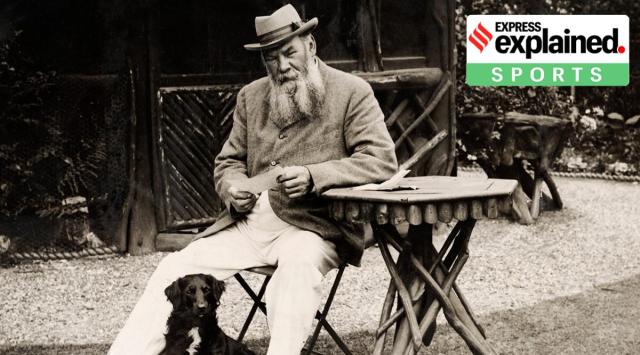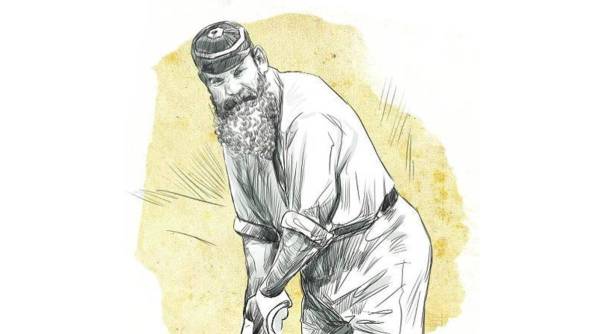- India
- International
The myths and half-truths of Victorian-era batsman WG Grace
General Knowledge books call him the ‘Father of Cricket’. It reeks of aridity. In Victorian England, Grace was Ben Stokes multiplied by 10. If social media had existed back then, he probably would have trumped David Beckham in fan-following.
 Grace on his 66th birthday in 1914. (Source: The Cricket Monthy via Wikimedia Commons)
Grace on his 66th birthday in 1914. (Source: The Cricket Monthy via Wikimedia Commons)The hard numbers say that between 1865 and 1908, WG Grace played 870 first-class matches and scored 54,596 runs, including 126 hundreds. He also took 2,809 wickets during that period. The Wisden Almanack has now chalked off some of those runs, a few of those wickets and a couple of centuries, as 10 matches were deemed not to be of first-class nature. More than anything else, the numbers spoke volumes for his longevity. He also played 22 Tests and scored 1,098 runs, which makes him an average Test cricketer. But it would be a crime to judge the game’s first superstar through the hard numbers.
General Knowledge books call him the ‘Father of Cricket’. It reeks of aridity. In Victorian England, Grace was Ben Stokes multiplied by 10. If social media had existed back then, he probably would have trumped David Beckham in fan-following. To put things in perspective, cricket was the Empire’s national game in the 19th century, not football.
Grace, born on July 18, 1848, was the man who established (figuratively) and popularised cricket. He was a cricketer of mythical proportions, who reportedly earned more than the professionals despite being an amateur. Myths and half-truths have always sat comfortably with Grace, as Victorian England revelled in his larger than life image. It allowed him to carry on batting even after being out bowled. He claimed bump catches and ran an opposition batsman out when he was gardening the pitch. He would tell an umpire without batting an eyelid that the spectators had come to watch him bat after being given out LBW. Grace had even allegedly kidnapped an Australian batsman once and made him play for Gloucestershire. He was too big to be called out.
Kidnapping of Billy Midwinter
The Gloucestershire born Midwinter had migrated to Australia and played cricket for Victoria. As ESPNcricinfo reports, on June 20, 1878, he was padded up to go out to bat for his adopted country in a tour game against Middlesex at Lord’s. Gloucestershire were playing against Surrey at the Oval on the same day, but as Midwinter’s team-mate Tom Horan wrote, the former was “determined to return with them to the colonies, where he had been promised a benefit match in both Melbourne and Sydney”.
Midwinter had joined Gloucestershire a year previously and had a gentleman’s agreement with Grace that he would be available to play for the county when required. On match day, as Grace found that his team was one player short, he took a cab, gatecrashed into the visitors’ dressing room at Lord’s, ‘kidnapped’ Midwinter and headed back to Oval, where the game was already underway. A livid Dave Gregory, then Australia captain, assembled his troops to snatch Midwinter back and the two parties almost came to blows. The Australian team manager John Conway sent a letter of complaint to Gloucestershire, and Australia even threatened to cancel their tour game against the county. Eventually, Grace apologised.

 General Knowledge books call WG Grace the ‘Father of Cricket’. (Illustration: Suvajit Dey)
General Knowledge books call WG Grace the ‘Father of Cricket’. (Illustration: Suvajit Dey)
The birth of Ashes
Grapevine has it that Grace’s gamesmanship incensed Australian fast bowler Fred Spofforth to the extent of bowling a spell that set the Oval on fire. On August 29, 1882, as England were chasing a victory target of 85, Spofforth allegedly barged into the home dressing room and called Grace a “cheat” for running out Sammy Jones, when he was gardening the pitch. “This will lose you the match,” Spofforth had reportedly said after going full throttle with his abuse.
The fast bowler finished with 7/44, as England lost by seven runs. A deathly silence descended on the ground. That was the first time England lost a home Test. Journalist Reginald Shirley Brooks wrote a mock obituary of English cricket in Sporting Times: “In Affectionate Remembrance of English Cricket, which died at the Oval on 29th August 1882, Deeply lamented by a large circle of sorrowing friends and acquaintances – R.I.P. NB – The body will be cremated and the ashes taken to Australia.”
There’s, however, a counter argument that the verbal exchanges in the dressing room between Grace and Spofforth never happened, for when the Aussie came into the home dressing room, Grace, a qualified doctor, was upstairs, treating a spectator who was vomiting blood. In fact, factual errors always gathered momentum around Grace, which added to his legend. It was widely believed that the ‘good doctor’ charged a personal fee of £1,500 for taking a team to Australia in 1873. Later, Wisden mentioned that there was “no firm proof” to support it, as the tour’s chief promoter was “close to bankruptcy”.
There have been immortal anecdotes around him, like declaring the innings while batting on 93, as he wanted to achieve every score between 0 and 100. Legend has it that he once shouted ‘The Lady’ when the opposition captain spun the coin at the toss and decided to bat first.
“It does nothing to diminish the great cricketer, instead it culls out unnecessary lies, Wisden is a book of record, romanticism need not be done through lies. It was purely a rational decision,” Lawrence Booth, the editor of Wisden Almanack, told The Indian Express after the course correction. He is right. Grace bade adieu to life on October 23, 1915. But to paraphrase Elton John, his candle burned out long before, his legend ever will. Even in 2022, Grace is remembered through the statues of him, the gates named after him and people writing stories about him.
More Explained
Must Read
EXPRESS OPINION
Apr 20: Latest News
- 01
- 02
- 03
- 04
- 05









































